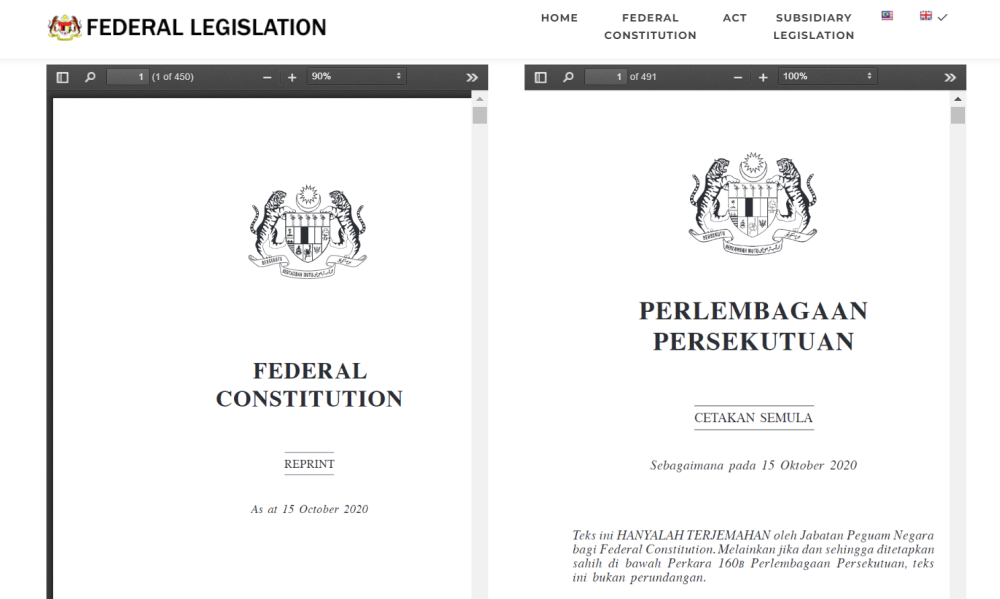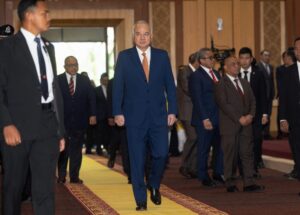- Sabah Law Society (SLS) argues Sabah’s and Sarawak’s consent are legally required, before anyone makes the Federal Constitution’s BM translation override the original English text.
- SLS said its court case is not against Bahasa Malaysia’s status as the national language.
- SLS said Malaysians’ rights would be affected, if existing differences in the Federal Constitution’s original English text and BM translation are not resolved before the BM text is made authoritative.
KUALA LUMPUR, Nov 7 — The Sabah Law Society (SLS) has asked the High Court to ensure that Sabah’s and Sarawak’s consent is obtained before any attempt is made to make the Bahasa Melayu translation of the Federal Constitution override its original English text.
The legal professional body representing Sabah’s lawyers stressed, however, that the case was not against BM or the Yang di-Pertuan Agong.
SLS president Datuk Mohamed Nazim Maduarin confirmed with Malay Mail that the case was filed yesterday at the High Court of Sabah and Sarawak in Kota Kinabalu.
“This case is brought in the public interest. Its outcome will have lasting implications for constitutional interpretation across Malaysia, the preservation of Sabah and Sarawak’s special position within the Federation, and the protection of the rule of law,” he said in a statement on SLS’s official Facebook page.
SLS said the case seeks to protect constitutional safeguards that require Sabah’s and Sarawak’s agreement before any move that could affect their rights, including language, religion and native matters.
The case centres on Article 160B of the Federal Constitution, which allows the Yang di-Pertuan Agong to prescribe the Bahasa Melayu translation of the Constitution as the authoritative text. The same article also provides that the Bahasa Melayu text would prevail over the English version in case of discrepancies.
SLS argues that such a declaration cannot take effect without following the constitutional procedures in Article 159, obtaining the two Borneo states’ consent under Article 161E(2), and respecting Article 4(1), which states that the Federal Constitution is the supreme law of Malaysia.
What SLS wants
“The case seeks to ensure that any move to declare the Bahasa Melayu version of the Federal Constitution as the authoritative text is carried out only in full compliance with constitutional requirements,” SLS explained.
It is asking the High Court to decide on five constitutional and legal questions and to make a declaration safeguarding Sabah’s and Sarawak’s constitutional position in the federation.
SLS said it filed the case in response to a separate legal action filed by lawyer Mohamed Haniff Khatri Abdulla on July 21 in the High Court of Malaya in Kuala Lumpur.
In that case, Haniff sought a court order to declare the Bahasa Melayu translation of the Federal Constitution as already authoritative, or to have it made authoritative within five years. The case has yet to be heard, with the next case management fixed for December 3.

A screen capture shows the Federal Constitution in both English and Malay displayed on the website of the Attorney General’s Chambers.
Not challenging BM or Agong
SLS said that Bahasa Melayu’s status as the national language is firmly enshrined under Article 152 of the Federal Constitution and that it fully supports this position.
However, it expressed concern about existing discrepancies between the English and Bahasa Melayu versions of the Constitution, warning that any attempt to bypass the proper process could alter legal provisions affecting religion, language and native rights.
The society said such changes could undermine the safeguards promised to Sabah and Sarawak under the Malaysia Agreement 1963, which formed the foundation of their entry into Malaysia.
As an example, SLS cited Article 12(4), where the English version requires both parents’ consent on matters relating to a child’s religion, while the Bahasa Melayu version could be interpreted as allowing one parent to decide.
“Such discrepancies could affect settled legal interpretations and the rights of citizens if the Bahasa Melayu text were made authoritative without proper harmonisation,” it said.
“The SLS supports the harmonisation of both language versions of the Constitution but insists that this must be done through a transparent process that identifies and reconciles all material differences, informs Parliament and the public, and, where necessary, amends the Constitution with the required consent of Sabah and Sarawak,” it added.
SLS reiterated that its case is not directed at the Yang di-Pertuan Agong and is instead intended to safeguard His Majesty’s constitutional role and dignity.
It explained that ensuring proper constitutional procedures are followed would prevent the Agong from being put in a position where any declaration under Article 160B could later face legal challenges.
SLS’s legal team for the case is led by its immediate past president, Datuk Roger Chin.
The Federal Constitution was drafted in English and has been the authoritative text in Malaysia since 1963, while the BM translation was reportedly launched in 2003 and its latest reprint in 2020 clarifies that it has not been prescribed as the authoritative text under Article 160B.





